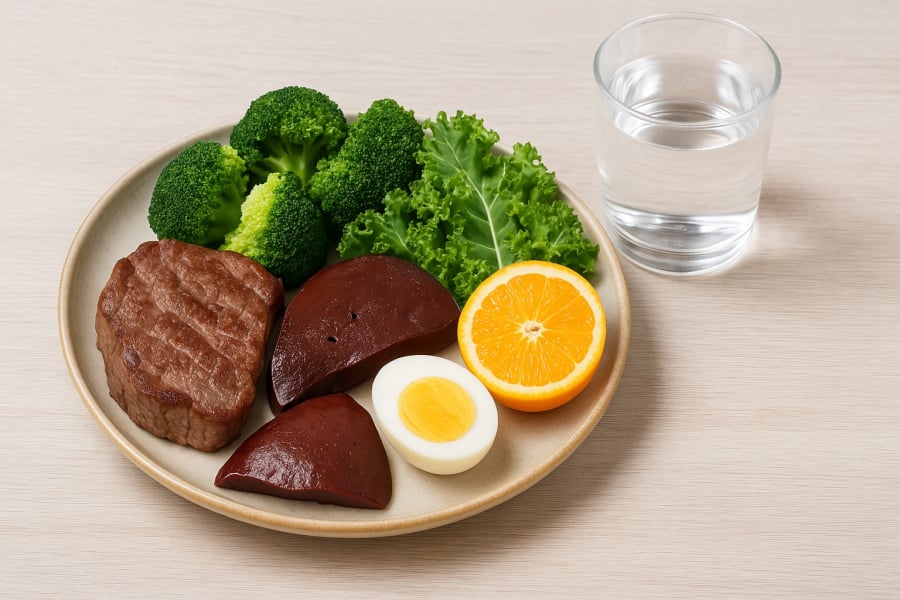Healthy Blood: The Foundation for a Strong Body
Blood is not just a life-giving fluid that carries oxygen and nutrients to every cell; it also plays a vital role in our immune system, detoxification, and maintaining overall well-being. When blood health declines or there is a deficiency, the body can easily fall into a state of fatigue, reduced immunity, and increased susceptibility to illness, impacting both physical appearance and mental health.
Women are particularly susceptible to anemia due to menstrual cycles, pregnancy, or imbalanced diets. Signs such as pale skin, dizziness, frequent tiredness, and shortness of breath may indicate that your blood is crying out for proper nutrition.

Three Essential Nutrients for Healthy Blood
A well-rounded and diverse diet is key to supporting healthy blood production. Here are the three most important groups of nutrients to keep in mind:
Iron: The Building Block of Red Blood Cells
Hemoglobin, the oxygen-carrying component of red blood cells, cannot form without adequate iron. This mineral plays a central role in delivering oxygen to every cell in the body. Iron deficiency leads to iron-deficiency anemia, one of the most common types of anemia.
To ensure your body receives sufficient iron, include the following iron-rich foods in your diet:
- Animal sources: Beef, chicken liver, eggs, and seafood.
- Plant sources: Spinach, lentils, pumpkin seeds, and whole grains.
Note: Plant-based iron is less absorbable, so combine it with vitamin C-rich foods like oranges, pineapples, or bell peppers to enhance absorption.
Vitamin B12: Supporting Bone Marrow Function
Vitamin B12 is crucial for DNA synthesis and cell division in blood production. A deficiency in B12 can lead to anemia and impact the nervous system.
Food sources rich in B12 include:
- Animal livers such as chicken or beef liver.
- Seafood (salmon, sardines).
- Eggs, dairy, and dairy products.
Acid Folic (Vitamin B9): The Crucial Blood-Building Vitamin
Acid folic, or folate, is essential for the formation of red blood cells. Its deficiency in pregnant women is associated with an increased risk of neural tube defects in infants.
Food sources of folate include green leafy vegetables (spinach, broccoli), beans, oranges, avocados, and fortified cereals.

Mighty Micronutrients
In addition to the big three, several other micronutrients play a supportive role in blood health:
- Vitamin C: Enhances iron absorption and is found in citrus fruits, kiwis, and strawberries.
- Vitamin B6: Supports hemoglobin synthesis and is present in bananas, salmon, chicken, and potatoes.
- Copper: Helps the body utilize iron more efficiently and can be found in oysters, liver, almonds, and dark chocolate.
- Vitamins A and E: Protect blood cells from oxidation and boost the immune system.
Lifestyle Habits for Healthy Blood
A healthy diet is just one part of the equation. Adopting the following simple habits can significantly impact your blood health:
- Stay hydrated: Water helps prevent blood from becoming too thick and improves circulation.
- Light daily exercise: Walking, yoga, or cycling stimulate blood flow and promote blood cell production.
- Quality sleep: Deep sleep at night is when the body regenerates blood cells.
- Limit processed foods: High sodium and preservative content can “toxify” the blood and hinder blood-making functions.
When to Seek Medical Advice
If you frequently experience fatigue, dizziness, memory issues, pale skin, or shortness of breath during light activity, these could be signs of anemia. Women who are long-term vegetarians, individuals with digestive issues, or pregnant women should consider regular blood tests to detect any abnormalities early on.
In Conclusion
Sometimes, a small change in your diet or daily routine can make a significant difference in your blood health. Don’t wait for your body to sound the alarm; start nurturing your blood health today with simple yet loving habits. Listen to your body and take charge of your well-being from within.






























